Sapphira Olson's Blog
November 27, 2025
2026 Nude Art Calendar
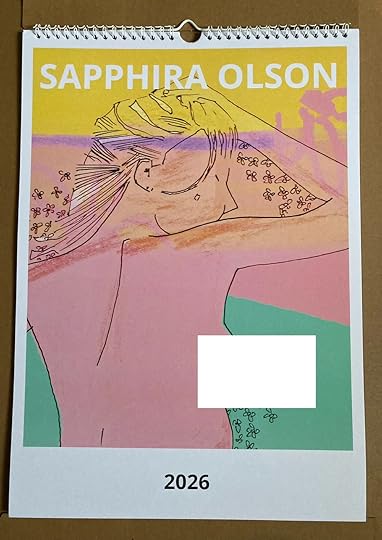
New in my shop is a lush A3 art calendar of some of my nude artwork.
There are a super low amount of these so head over to my ebay shop or get one here in my on-line shop by clicking here.
Saph X
July 25, 2024
She-Hulk - Here’s the thing, Bruce. I’m great at controlling my anger
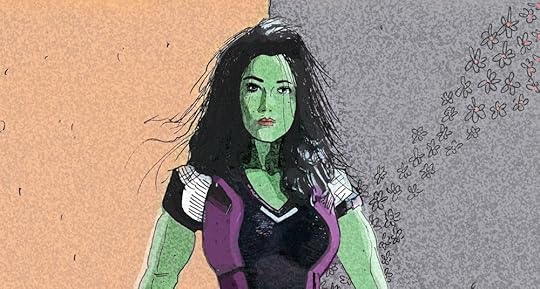
Just for fun some artwork of She-Hulk that I did last week.
“Here’s the thing, Bruce. I’m great at controlling my anger. I do it all the time. When I’m catcalled in the streets. When incompetent men explain my own area of expertise to me. I do it pretty much every day. Because if I don’t, I will get called emotional, or difficult, or might just literally get murdered.” She-Hulk
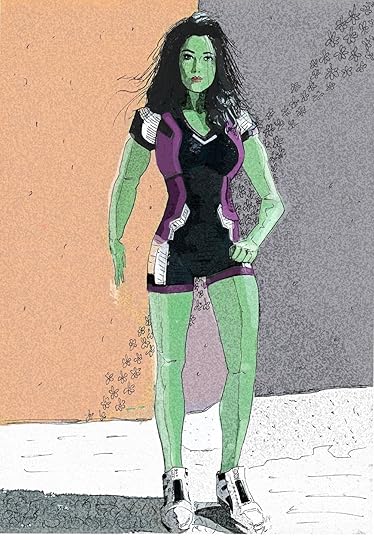
July 9, 2024
Interview with Julian Barnes

This is an extract from an interview I did with Julian Barnes back in 2008. Barnes has received several awards and honours for his writing, including the 2011 Man Booker Prize for The Sense of an Ending. Three additional novels were shortlisted for the Man Booker Prize (Flaubert's Parrot 1984, England, England 1998, and Arthur & George 2005)
Tell me a bit about yourself.
Six foot two, eyes of blue – will that do? Faulkner said a writer's obituary should consist of the line: 'He wrote books, then he died.' Not a bad anonymity to aim at, but nowadays impossible.
Out of the books you have written, which has been your favourite and why?
It varies. The first because it was the first, the second because it proved I wasn't a one-book author, the third because it was the first to be translated, and so on. If someone mentions a book of mine and says they really didn't like it (not that this happens very often), I instantly think it's the best of all. Writers are a contrary breed.
What does the novel do in today’s culture and do you think it has changed from Renard's day?
It does what it always does: it tells a story which tells the truth. Forms change, social reality changes, but the point and meaning of narrative have changed very little - as has the human animal.
What advice would you give new writers?
Don't do it unless you really want to; don't do it expecting to earn a living from it; don't do it expecting praise, or to solve the problems of your life; don't do it in the belief that you live in a country which is broadly welcoming to culture; don't do it unless you love language and narrative and form. And don't listen too much to advice-giving writers clutching their bus passes. Find your own way.
What do you think about the state of the publishing industry today and has it changed since you started?
It's changed enormously. I spent seven or eight years writing my first novel, hesitantly delivered the manuscript, got £750 (I think) for it, did a single interview to publicise it, watched the book just about scramble into paperback, savoured the moment and the whole process, loved 'being a writer', but still never imagined I would make a living from writing books. Publishers didn't expect to make money from a 'literary novelist', as they were quaintly called, for three, four, five books - a literary career was, characteristically, something that was slowly built. Nowadays a novel may be bought from a first-time writer on the basis of a synopsis, 50 pages, a c.v. and a glamorous photo - and lots of money may be paid. And then the marketing of the book kicks in, and if the book takes off, the young star is suddenly in a world of photographers and multi-city tours. The commercial pressures are much, much greater – the publisher wants their money back, the pressure on a young writer to write that 'break-through' book is more severe. I'm not against young writers making money - on the contrary. But I am in favour of young writers writing the best books they are capable of. And being protected against disappointment. Though maybe disappointment will make them better writers, who knows?
July 3, 2024
Tom McCarthy - Don't Go Anywhere Near a 'Creative Writing' Class
Tom McCarthy is an English writer and artist. His debut novel, Remainder, was published in 2005. McCarthy has twice been nominated for the Man Booker Prize.
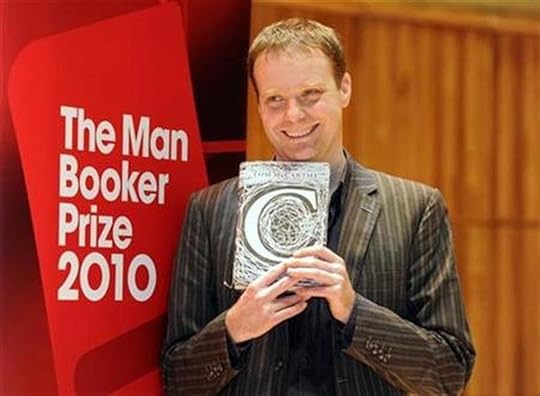
This is a snippet of an interview I did with him back in August 2008.
What's your ideal night out/in?
I once woke up to find, on my coffee table, a pair of skimpy knickers, white powder residue and an open copy of Francis Ponge's 'La Partie Pris des Choses'. I can't remember what I'd done the night before - but whatever it was, that's my perfect night.
When did you start writing?
When I was very young. My mother told me the story of Macbeth and I thought: that's great, I'll write it. So I borrowed a neighbour's typewriter and wrote 'Macbeth, by Tom McCarthy'. The neighbour said: 'Shouldn't it be 'by William Shakespeare?' and I asked: 'Why?' I was right. Someone wrote Macbeth before Shakespeare too. I don't think I finished my version; somewhere around Act II I went and played outside instead.
How did you feel about Metronome's response to Waterstones to stock Reminder that, "If people want it, they can go to the ICA."
Metronome Press was an art project, run by two curators, launched firmly from within the art world and its networks. Having one foot in that world myself, I'd noticed that that was the environment in which people actually read proper literature rather than the latest Booker/Richard-and-Judy crap. So I was happy for them to take that stance. Perhaps at the time I wasn't, but in retrospect I thought it was pretty cool; and as it worked out, bigger publishers would bring out their own editions of Remainder later and put them in Waterstones and every other shop. The Metronome edition was just a limited run thing anyway.
The title of the book "Remainder" is the same term used for books returned by retailers that are not sold. Was this an intentional joke on your behalf and how confident were you that the book would sell?
I was aware of the bookselling connotation of the term 'remainder', and liked it, but it wasn't the main one. I was thinking mainly of residues, marks, traces, things left behind; also the half in the eight-and-a-half million pound settlement the hero receives. I had no idea if the book would sell a lot or not; the question didn't cross my mind. What interested me was the kind of critical response it would get.
What advice would you give fellow writers?
Read voraciously, and don't go anywhere near a 'creative writing' class.
June 25, 2024
Dave McKean Interview
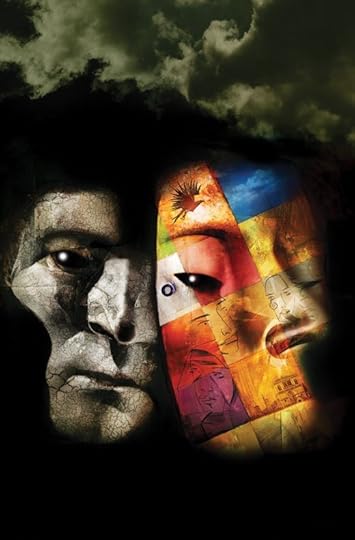
This is an extract of an interview I did with Dave McKean back in 2010. Dave's work incorporates drawing, painting, photography, collage, found objects, digital art, and sculpture. He has illustrated works by authors such as Neil Gaiman, Grant Morrison, Heston Blumenthal, Ray Bradbury and Stephen King. He has also directed three feature films.
...
Can you set the scene for a typical day – do you work from a gothic castle with a moat full of crocodiles – are there images pasted all over your floor and walls?
Yes. Well, okay, not really. I work at home. There are turrets, although they are really the rather more mundane, oast house roundels, and there is a moat, again, rather more mundane fish pond with rickety bridge over to my studio. Some people prefer to be surrounded by their own work, others prefer to look at other people's. I'm in the latter category. I try and keep the place pretty clean and sorted. I find it hard to work, or think, in a mess.
Do you aim to re- interpret the author’s work or provide images that match the text or a mixture of both?
It depends on the book, they all have their own demands. As a general rule I don't really like illustrations that just literally show a selection of scenes from the story. I think the pleasure of a book is seeing those scenes in your own mind. However, if you can find a way to create a mood, a feeling, or emphasise the drama, then that's usually a good start. Even better, if the imagery has its own job to do, then that is the ideal.
Do you think we should be exploring the themes of death more in children’s art and literature as it is often a taboo subject in adult conversation.
Not obsessively, but ultimately all art and writing is about death to a degree. It's the final deadline. It can only do good to open these tough subjects up for discussion and the imagination in young readers. That's what stories and art are for, to deal with these kinds of emotions in a safe place. To see that we do come out the other side of fear, grief, shock - that we can carry on. They are rehearsals for adult life.
Are you fed up with people asking you what Neil Gaiman’s like to work with and how much do they airbrush him these days!?
No, I've had a long working relationship with Neil, so he always comes up. And yes, it is amazing what you can do with photoshop these days.
What’s Neil Gaiman like to work with?
Who?
Pet hates? Things that drive you nuts?
People mostly. Too many of them. Queues. Tourists (why can't they just stay home and send money?). General bigotries and belief systems. Middle men, grey men, money men, marketing departments. Pushy parents. People who drive cars while wearing hats, people who drive in the fast lane all the time, or undertake on the motorway. Just other drivers generally really. I watched The Omega Man, and thought Charlton Heston had a pretty good life.
Can I have a signed photo and picture?
Of what? Neil, I assume.
June 21, 2024
The Book Thief's Markus Zusak Interview
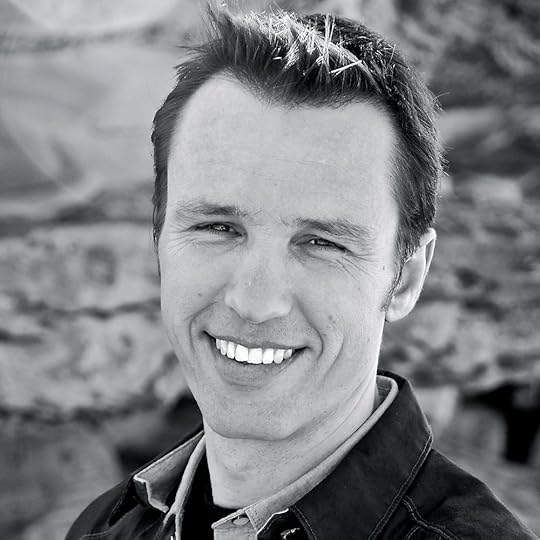
This is an extract from an interview I did with The Book Thief author Markus Zusak back in 2009....
How did you get your first publishing deal and how did that feel?
I guess I’m what you call a slush-piler. I just sent my manuscripts to the slush pile of publishers and hoped for the best. Over seven years, I was rejected seven times on three different books. The fourth attempt was picked up by a small publisher, and I still have great memories of staying up all night, talking to my brother and sister.
How do people react to you when they find out you’re a writer?
It can go in almost any direction. Some people have no idea what to do with it. Some tell you about the book they would write, if only they had the time. On the whole, though, people are generally very positive and interested, because they haven’t met a writer before. My friends, though, they usually rib me about how I just sleep in and watch Oprah and that I don’t really have a proper job. I’ve given up arguing now, so I just agree with them, even though half the time I’ve started work before they have. Still, it’s best to keep the romantic idea alive. If they call around midday and ask if they woke me, I always say yes.
Any general advice about writing?
Just to not be afraid of failing. Failure has been my best friend as a writer. When I spend months, even years failing over and over again on a book, those failures usually lead me to the more original ideas in the story. Each one brings you a step closer to what will work.
What influences helped form the character of Death in The Book Thief?
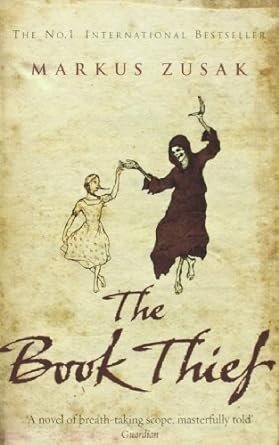
I guess working on it was the main influence. Originally I couldn’t get Death’s voice right because it was too typical. He was macabre and he enjoyed his work too much. It was only when the voice became more vulnerable that I started to really enjoy writing the book. I thought it made sense that Death could be afraid of humans, since he’s on hand to see all the terrible things we do to each other. Then it would also make sense that he’s telling the story of the book thief to show that humans can be beautiful and selfless and worthwhile.
Finally have you stolen anything?
Plenty!
June 19, 2024
Publishing Deal
News!
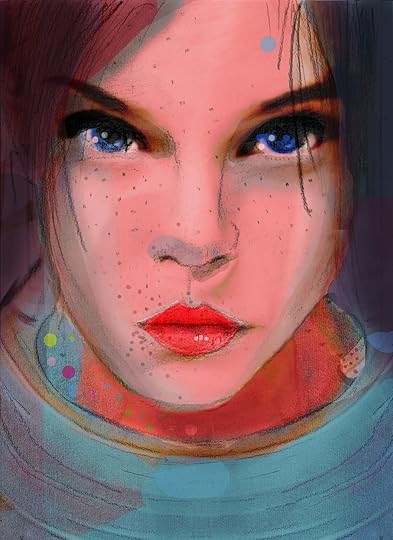
Full details at a later date but for now I am very happy to say that I signed contracts on my birthday last Sunday with an American publisher for my romantic sci-fi novel The Woman in the Ship - I am super excited and what a present!
Champagne at the weekend with our best friend and all going well the novel should be out in the first half of next year.
Can’t wait for people to see it, I have written a lot of novels - this is my seventh, but it’s my favourite and still spinning around my head now x
June 12, 2024
From the Archive: Interview with Iain M Banks
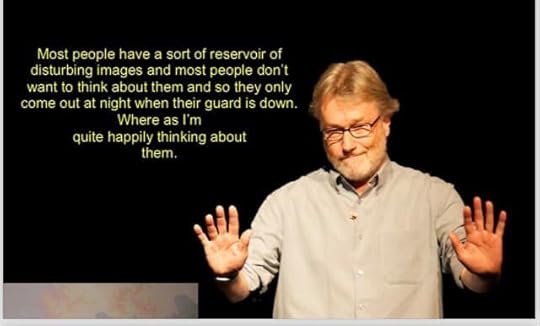
In 2008, The Times named Iain Banks in their list of "The 50 greatest British writers since 1945.” Here’s an extract from an interview I did with him in 2010. Sadly he died less than 3 years later of inoperable cancer.
….
We’ve just had the Man Booker prize winner announced. How do you feel about book prizes?
I’m not a big believer in prizes, they’ve got a place, they’re good general publicity for whatever it is they’re publicising in the first place but I always think you can’t really tell what the great books are of any sort of time until maybe 10 or 50 years or a hundred years later so I don’t entirely believe in them. But I don’t hate them or resent them or anything. If I was emperor of the universe I certainly wouldn’t ban them. ( laughs ) I don’t understand soap operas either but I wouldn’t ban them as well.
But do you want one?
Well yes, I suppose yeah it would be nice to have something like that but I don’t think it’s very likely to be honest.
Because of the sci-fi?
Well yeah I’m kind of a serial reoffender – I think if maybe I’d written a couple of science fiction novels and then stopped and put it behind me a few years later I might -
Got rid of that fifthly habit?
Yeah kinda, but if you’re trying to promote the idea of English literature and British literature or British commonwealth, whatever, to the world, which in a sense is what it’s really meant to be about, then the knowledge of the person who you’d be honouring, the book you would be honouring to be followed by a science fiction novel – a lot of people are still very down, very snobbish about science fiction. Of course the other alternative explanation of not having won more prizes is the books aren’t good enough. I think one has to at least entertain this idea ( laughs ) Obviously I think they’re all works of outstanding genius, but I may be slightly bias. Actually even I don’t think that.
How do you feel about social media sites?
Kind of neutral at the moment, I can’t be bothered, it’s not for me - I just can’t be bothered with the idea. I don’t want to be too contactable. My phone spends a lot of the time off, I love to have it, it’s good to have it there, but I like to be in complete control. I’m just not that sort of bothered about listening and being in close contact with anyone and everyone. Also I spend so much time – my working life is spent in front of a screen tapping at a keyboard, even though you might be tapping away at a tiny little keyboard or a touch screen on a phone, it still kind off feels like the same thing - it feels like work so I’m just not interested.
You talk about dreaming in Surface Detail and you make this comment about someone being a slightly different person when they wake up in the morning from before they went to sleep. What was your thinking behind that?
Well I was thinking about that whole thing about, if it’s possible to utterly and completely read someone’s consciousness and then to recreate it in another brain or any other substrate, whatever - is that person the same person? I think that well, in a sense, no there’re not but you still have to treat them in the same way and it’s a copy, that the original is still around and it might get a bit complicated in meeting terms. Does the copy, even if you know it’s a copy, does the copy still have full rights or whatever? Anyway all that stuff is very interesting and I thought that obviously waking up from something traumatic, especially if you’ve died violently and then been brought back to life, that’s going to change you. But as soon as you start thinking about that – it’s something that no one has ever experienced - so I thought it would be a complete step change in human experience. Of course as soon as you think that you automatically think, well is it? Think about this. Well people have been in comas for many years, they must wake up to a different world and they’re physically different, they’ve aged. And you think well carry that on, you think further, you think well in a sense when we go to sleep at night that’s the end of that person as that individual. It’s a very purist kind of thinking, there’s no argument: you are the same person but in a way you have changed slightly. The person who goes to sleep is not exactly the same person that wakes up apart from the even more trivial aspect – you’ve aged by hours or whatever. You might well have had dreams, they might well have been traumatic dreams or extremely pleasant dreams or they could have been inspiring dreams – people have had ideas in their dreams.
And have you had ideas and inspirations?
Once or twice, very, very rarely indeed. I have incredibly boring dreams. My explanation for this is I get rid of all my imaginary delusions and stuff in my literature, in my writing. ( laughs )
You work it out of your system.
Yes, so there’s nothing left so my dreams are dead, dead boring. Very occasionally I’ll have something that’s mildly interesting.
I bet a lot of people would be disappointed to hear that.
Yeah, there’s a mechanism at work there – most people have a sort of reservoir of disturbing images and most people don’t want to think about them and so they only come out at night when their guard is down. Where as I’m quite happily thinking about them. So I tap the reservoir during the day with my conscious mind, I don’t have to worry about it happening when I’m asleep. So yeah maybe they’d be disappointed but I think they’d see there’s a plausible mechanism at work there.
You talk about disturbing images: one of the things in your books that really stays in my mind is the way you kill people. In Surface Detail you follow Vatueil quite closely and he survives a gas trap in a tunnel and then it takes another page and suddenly he’s dead and been thrown from a giant –
Trebuchet ( laughs ) yeah.
Do you enjoy writing that kind of stuff, because it’s very vivid.
Not particularly. Well certainly not in a sadistic way. But it depends what sort of stuff you’re writing about and giving myself free reign to write about anything at all and if you write about something that involves conflict, especially warfare, then you’ll inevitably going to find yourself writing about grisly stuff. And in a sense you can’t disguise that, you have a responsibility, journalistic anyway, to cover the story. You might be making the story up but once you’ve embarked on that road it’s cheating to turn the camera away and not see what happens next. That’s not fair. That’s kind of sanitising war. That’s like the news channel’s approach to war: you never see the horror of war on television, you just don’t. I think that helps the war to continue. If you saw lots of horrific injuries and so on then perhaps we wouldn’t be so blasé about the heroic work our boys are doing out in Afghanistan or anywhere else. It’s not to criticise them and ultimately it’s to criticise the politicians for putting them there but there is this sort of complicity, the news services in particular television which is where you see the most shocking images – I think it could be much more stomach churning than more a perfectly told piece of journalism that helps to maintain the war. So I think it’s a type of dishonesty. So I think if you’re writing about that sort of stuff you have to be true to it and describe it.
In the Culture money has become irrelevant do you think we’ll ever end up like that?
I’d love to think so, but not in our present form no. We’d have to …
A) Get to the post scarcity thing.
B) Somehow be nicer people perhaps by genetically modifying yourself and
C) We’d probably have to invent new AIs that were trusted and were much more intelligent than we are and then give them power that might make a difference.
Once we fulfill all three of those criteria then maybe. ( laughs )
A breeze then.
Yeah a breeze, the middle one is the hardest. I don‟t think I could make myself nice.
Is there a grand plan for the Culture, are you taking it somewhere or just having fun with it?

No – and yeah it will go on until I stop having fun with it and then I will just sort of leave it to be. There’s no overall strategic plan and in a sense that is the plan, having no plan is the plan. The plot of the Culture is not going to come to some huge climatic end, well unless I come up with an idea that can only work in those terms but I’ll try not to. That is the Culture just keeps on going: it’s this society where by now you might have expected it to sublime, to retire from the normal matter base life of the galaxy and the universe and go off into this magical realm. (Which I may have to deal with as I keep getting asked about it these days, so I’m going to have to explain what the hell it is.) But it’s definitely not doing this, deliberately staying back and surfing the crest instead of going down the wave - it wants to keep on doing good works, it wants to be part of the normal life of the galaxy. So it’s deliberately not doing what it’s expected to do. So that theme of continuance, of sticking around – like passiveness, almost bloody mindedness is why it can’t just all suddenly come to a big crashing stop and I think eventually it will fade away, but it’s going to leave lots of echoes.
You’ve got a good sense of humour which comes out throughout the book, for example you name the ships things like, Falling Outside The Normal Moral Constraints and Wit Amidst Folly. Where do they come from and are there names that didn’t make it through to the novel?
O God - I’ve got a list of about two and a half thousand ship names. It’s been building up for a long time -
Seriously?
O yeah, literally years. Huge document: full of I suppose about forty odd pages of typing - I use quite a small font and out of those there’s probably only about a few per page that have been used. So O God there’s millions, well hundreds and hundreds more to come. It’s just keeping your eyes and your ears open for a good phrase to put in the pages but sometimes I find myself, when I think about it, I’m thinking like a Starship manufacturer. Or the Mind that is in control of it thinking about people like us – a primitive society and culture - attitude to them and what they must feel, so a lot of the ship names come out of that. It’s partly the idea that the Culture is there: it is watching, it might not come and interfere, but it knows what you’re up to. That’s why there’s a ship in Surface Detail called Me I’m Counting. That whole thing about who’s counting? Well your fictitious God isn’t, that doesn’t exist in the first place, but we’re here, we’re counting, ha ha and one day … ( laughs )
You obviously have a lot of fun with it.
A huge amount of fun, I have to stop myself from having too much – yeah it’s one of these sort of perks of the job, what’s this particular starship's name.
April 11, 2022
FREE on KINDLE until the end of the world on Friday
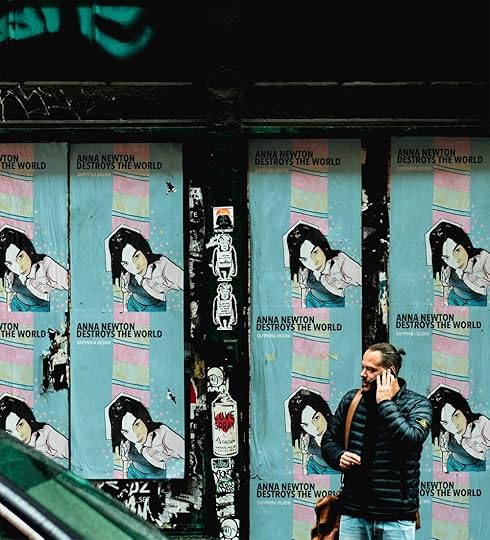
My lastest novel Anna Newton Destroys the World free until the end of the world this Friday.
Click here
April 7, 2022
Out now - Anna Newton Destroys The World

Anna Newton Destroys The World
In the beginning God created the heavens and the earth and he pretty much messed that up. Time for his ex-wife Anna Newton to pull it all down. She’s pretty upset after the trauma of being with him.
You do not even know, Anna.
But you will.
She is the woman who will destroy the world.
Do not mourn the loss of your planet,
instead marvel at the colour of the sky above you
and the place upon which you will tread.
KINDLE out 30/03/2022
UK: click here
USA: click here



